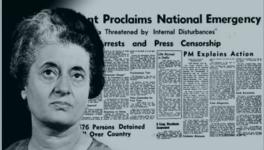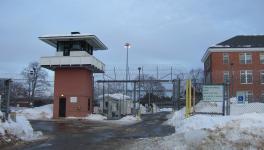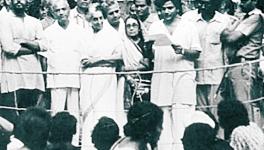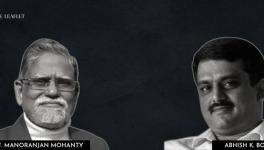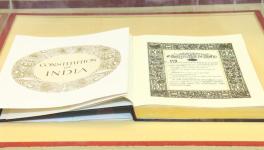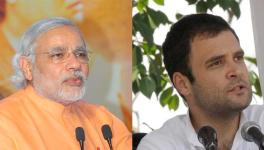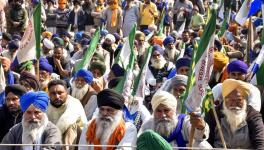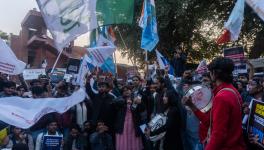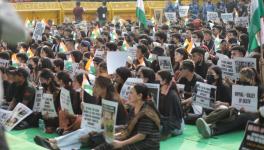Close Shave in August 1975
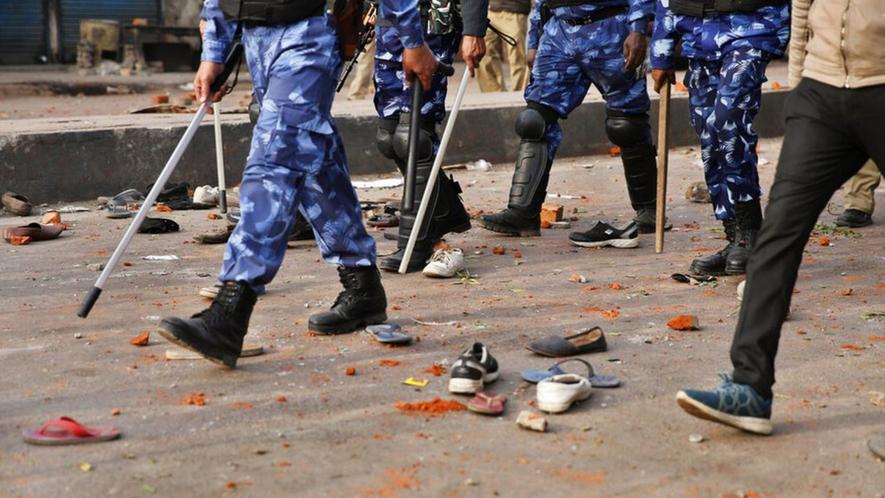
As part of our Special Issue marking the 45th Anniversary of the declaration of emergency, we bring to you stories by people who fought against the tyrannical government. The author, who was then a student activist, narrates a gripping tale of his close escape at the hand of officials in an atmosphere of state excesses. He notes, that the same officials known for torture were later rewarded by the political stalwarts of INC.
———-
It was a rainy August evening in 1975. A little over two months ago the Emergency had been declared. Mrs. Indira Gandhi had suspended civil liberties and put all the senior opposition leadership and activists in jail.
The rain was coming down in sheets. The water cascaded down the softly inclined road. Small puddles had formed all over the road. A rivulet of muddy water was flowing from the upper ridge down the ill-lit street that we were on, meandering its way to Shankar Road, the main arterial road that marked the divide between Old Rajindar Nagar and New Rajindar Nagar, a suburb in West Delhi. The “Rajindar” in the name being the Punjabification of the name of the first President of India, Dr. Rajendra Prasad, after whom the area was named.
I had a little while earlier gone to the home of Ajay Natrajan in Old Rajindar Nagar to take him to an underground meeting of student groups opposed to the Emergency. Rama Shankar Singh, who later became a member of the state legislative assembly in Madhya Pradesh in 1977, had told me earlier that there was a coordination meeting of the student groups, that was hoping to call a university wide strike against the Emergency. Rama, as he was known, was close to Raj Narain and was part of the Samyukta Socialist Party (SSP).
Ajay was an elected Central Councilor from one of the South Delhi colleges. There were no direct elections to the Delhi University Students Union (DUSU) then as they are now. He was the only student councilor who identified himself with the Samajwadi Yuvajan Sabha (SYS), the youth wing of the then Socialist Party. I was then its General Secretary for Delhi state.
As we walked in the rain, my gut instinct told me that all was not well. My hunches or intuition had always served me well. Yet the rational socialist in me dismissed that gnawing tug in the stomach. It was a little after seven, but already dark because of the clouds and the steady incessant rain. The meeting was to happen at the house of Mr. P. N. Lekhi, or Pran Nath Lekhi, who was a well-known lawyer in Delhi and was close to political circles opposed to the ruling Congress.
As we approached the row of houses, Ajay and I peered through the sheets of water to try to decipher the house numbers. Mr. Lekhi’s house was on the left side of the road. Ajay found the house first and pointed towards it. I tugged at his sleeve and indicated that we should walk on, which we did. There was a roundabout a hundred yards ahead of the house as we approached it, we paused. I told Ajay I did not have a good feeling about being there. He dismissed my fears and said since we had come this far, we should turn back and go to Mr. Lekhi’s house.
Ajay was a step ahead of me. Ajay pushed the little gate leading to the front door and we climbed the step or two to Mr. Lekhi’s front door. Ajay rang the bell. It did not open immediately. After a few minutes, the door opened and a burly man, in civvies but with cop written all over him shouted, “Pakado” (“catch them”). The burly man’s arm shot out and held Ajay’s wrist. I instinctively brought down my folded umbrella hard on the man’s wrist and yelled to Ajay, “run!” We turned and ran towards old Rajindar Nagar with a few men chasing us.
I ran as fast as I could, my rubber hawai chappals (rubber slippers) came off while running and I left them, running on as fast as my bare feet could carry me. My breath was short and it was a few hundred yards down the road when I saw a small lane on the left side of the road, I turned and ran into it. As I turned into the lane, I saw Ajay falter and seconds later I caught a glimpse of a hand holding him. I knew that Ajay had been caught.
I ran on, a hundred yards down the lane, I noticed the ghanda nullah, the main open sewer channel that ran down from the ridge through New Rajindar Nagar. The nullah was deep over thirty feet as I realised later and about the same dimensions in width. I scrambled down the steep and slippery bank into the murky waters of the nullah. It was eerie. There was slime all around me and the odours were overpowering. I held my breath, or tried to do so as my heartbeat was at a frenetic pace.
I tried to inch my way away from the bank into a little natural arbor that had some overgrown keekar trees. No sooner had I reached the overhanging droop of the branch of the tree, I heard voices. “Yun aaya, salah” (“He came this way”). Salah, being an all-purpose swearword. The beams of powerful flashlights shone over the dark waters of the nullah. The rain was still coming down in sheets. I heard a gunshot, then another. This clearly added a new dimension to my fears. Until today, I have not been able to fathom whether it was real gunshots or blanks to frighten me out of the water. The seemed to be firing at the far bank of the nullah. “Paar kar gaaya hoga, b*******d” (“He must have gone across, the s*******”).
The beams of more flashlights swung across the bushes on the bank on the other side. A few minutes later, maybe five, maybe 20, I do not remember. All I remember was that it felt like a lifetime; I faintly heard the sounds of their walking away. They were clearly not too happy standing there in the pelting rain, inhaling the malodorous vapors of the nullah. I stayed put in the muck and filth. I was not taking any chances – what if they were lurking around the corner? It must have been a few hours that I was in the muck and slime. I moved a foot here and a foot there but was not willing to leave the safety of the drooping branches of the keekar tree.
It was only later, many hours later, when I walked across to Ajay’s house in New Rajindar Nagar, I realised that I had been in the nullah for over five hours. Ajay’s brother was older, and looking back now so many years later, I think a lot wiser and mature beyond his years. He took one look at me and I guess he smelled me too, all the stink from my drenched clothes. Some of the slime had been washed away thanks to the rain I had walked through, but the smell was quite certainly there.
I told him that I feared that his brother had been arrested. He got me a change of clothes, allowed me to have a quick wash. He offered me the use of the shower, but I was in a hurry to get away. I was ashamed, I had brought bad news, news of his brother’s arrest, yet he had not yelled at me or accused me of leaving his brother in police hands. He gave me an old pair of rubber slippers and I let myself out. I wanted to reach a safe house I had near Kishanganj, the railway workers colony. The room belonged to Teja Singh, an autorickshaw driver and a member of the socialist controlled autorickshaw union, which in the early and mid 1970s was quite strong in Delhi.
I walked past Gangaram Hospital down Old Rajindar Nagar towards Pusa Road. At the crossing of Pusa Road and Ajmal Khan Road, I spotted an autorickshaw driver sleeping in his vehicle. I shook him awake. He was not too happy to be woken up. The rain had now become an incessant drizzle from the torrent that it was earlier. The distance to the safe house was only two kilometers. I promised him twenty rupees. It was a lot of money in those days for a short ride. The sound of “bees rupiah” (twenty rupees) woke him up and soon we were off.
I had only just managed to settle down, leaning as far as I could to avoid the rain and the splatter from the wheels of the vehicle, when I looked out and my heart sank. We were at the crossing of Ajmal Khan Road and Arya Samaj Road. I saw a few autorickshaws all waiting at the edge of the crossing with three khaki clad men hovering around. My heart was in my mouth. Through all the muck in the nullah and the change of clothes at Ajay’s house, I had managed to hold on to a soggy bundle of leaflets railing against the Emergency. They were meant for distribution at the ill-fated meeting earlier at Mr. Lekhi’s home.
I should have got rid of them earlier. I cursed myself. Throwing them out of the auto rickshaw now was out of the question. It would only draw attention to me. As one of the khaki-clad figures approached the autorickshaw, he asked me gruffly where I was coming from and where I was going. I told him that I was going home from a friend’s house where I had been studying for an exam. In the dark, the leaflets must have looked like a book as I clutched them tightly in my left hand.
I realised that the khaki clad individual was not a policeman, but a home guard. Many of them had been drafted into patrolling duties and picket duty ever since the railway strike of 1974. Many of them were migrant labourers, mainly from Uttar Pradesh, but also from Bihar, exercising the heady power that wearing khaki conferred on them. Most of them looked forward to this job as it paid through extortion much more than a permanent mill hand earned in the big textile mills that still dotted west Delhi.
Fortunately, a policeman standing in the shadows yelled, “jaane do!” (“Let them go). My auto rickshaw driver was as relieved as I was as we sped away. I, for obvious reasons, and he because, he had not been relieved of the Rs. 20 fare that he was hoping to earn from me by the Home Guard. In a few minutes, we were near Teja Singh’s house. I stopped the autorickshaw a hundred yards away, waited until he left and knocked at the door. Sanctuary, at last, and a well-earned night’s sleep.
Two months later, on 6 October 1975 while I was in New Delhi’s Tihar Jail under the Defence of India Rules. I was told that Ajay had been bailed out a few days earlier. That he had been tortured badly. That for many weeks after he had been sent to judicial custody, he had not been able to sleep on his back. I was told that he had been interrogated regarding my whereabouts by the infamous Mr. P.S. Bhinder, then a Deputy Inspector General of Police but a willing minion of the ‘Son of the Dictator’, Sanjay Gandhi, son of then Prime Minister Indira Gandhi and architect of some of the worst excesses of the Emergency.
Later, The Shah Commission in 1978-79, enquiring into the excesses of the Emergency, indicted Bhindar.
“It is clear on the evidence that S/Shri PS Bhinder, KS Bajwa and Navin Chawla exercised enormous powers during the Emergency because they had easy access to the then prime minister’s house. Having acquired that power, they used it without considering whether the exercise was moral or immoral, legal or illegal. The commission is of the opinion that though the involvement of these officers may vary slightly in degree, their approach to the problems of the period relating to the citizens was authoritarian and callous. They grossly misused their position and abused their powers in cynical disregard of the welfare of citizens and in the process rendered themselves unfit to hold any public office which demands an attitude of fair play and consideration for others. In their relish for power they completely subverted the normal channels of command and administrative procedure.”
“In 2007, Mr. Bhinder got a Congress seat to fight the legislative assembly elections from Gurdaspur, but mercifully the good people of that constituency defeated him.”
In 2007, Mr. Bhinder got a Congress seat to fight the legislative assembly elections from Gurdaspur, but mercifully the good people of that constituency defeated him. The establishment had protected him all these years. K. S. Bajwa was the Superintendent of Police, Criminal Investigation Department (CID), in Delhi during the Emergency. The use of third degree was second nature to him. He went on to hold senior positions both in the Delhi Police and the Central Reserve Police Force (CRPF). Navin Chawla, Sanjay Gandhi’s henchman, went on to become the Chief Election Commissioner of India.
As we stare at an impending authoritarian order after the 1975 spell of dictatorial rule, it is still the same story. Impunity reigns supreme. Accountability exists as a pious aspiration, if at all. Plus ça change.
(The author works with the South Asia Human Rights Documentation Centre. Views are personal.)
Get the latest reports & analysis with people's perspective on Protests, movements & deep analytical videos, discussions of the current affairs in your Telegram app. Subscribe to NewsClick's Telegram channel & get Real-Time updates on stories, as they get published on our website.









